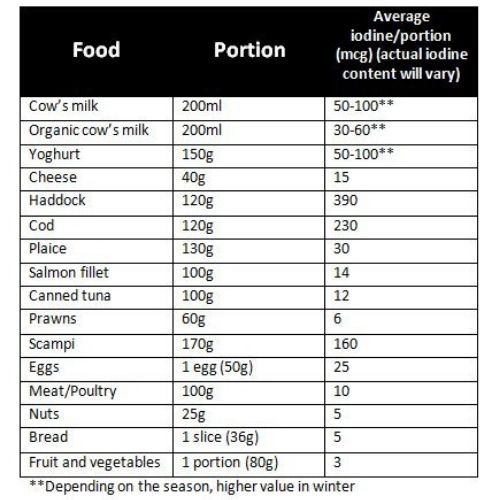If you can’t lose weight despite doing everything right, you may be low in iodine, a mineral essential to a healthy metabolism
When you’re trying to lose weight, there are some things that are non-negotiable. You have to keep an eye on your calories and take in less food than you burn off. You absolutely have to move more throughout the day, and do strenuous exercise that makes you break a sweat a few times a week (39 degree days don’t count because you’re already sweating). You need to sleep well and enough and keep a lid on your sugar and alcohol intake.
But you know all that.
If indeed, you’ve really, truly ticked all those boxes and that number on the scales isn’t budging, you might need to look at the nitty-gritty of your diet, in particular your intake of iodine, a mineral essential to a healthy metabolism.
In fact, in recent years there has been concern that adult women are not getting enough iodine in their diets, especially in pregnancy (iodine is essential to the health of a developing foetus).
Signs you may be low in iodine:
· Weight gain
· Low energy
· Hair loss
· Brittle nails
· Feeling tired all the time
· Enlarged thyroid gland

Why we need iodine
If you find yourself doing everything by the book to lose weight but still can’t shift the pounds, your iodine intake may be to blame.
Iodine’s main job is to help the production of thyroid hormones, which control the speed of our metabolism and the rate at which we use energy from food, says BioCare nutritionist Raihane Palagi.
Found in seawater, rocks and soil, iodine is an essential mineral your body can’t produce, so it needs to get it from food. That’s why ensuring you’re getting enough is essential.
Iodine’s main job is to help the production of thyroid hormones
Persistently low levels of iodine can lead to depletion of the body’s thyroid hormones and that can lead to what’s known as a ‘hypothyroid’ state, also known as an underactive thyroid, which can lead to weight gain; often the first symptom.
‘Thyroid hormones help control the speed of the metabolism, meaning they oversee the rate at which our body burns calories to produce energy,’ Palagi explains. ‘If thyroid hormones are low, more calories from food will be stored as fat instead of being used for energy production’.
Thyroid hormones oversee the rate at which our body burns calories – iodine is essential for this
Other symptoms can also include low energy and tiredness and in some cases, hair loss. ‘Thyroid hormones also help control the growth of hair follicles, so when thyroid hormone levels are low, hair follicles don’t regenerate as often as they should, which can result in hair loss,’ Palagi explains.
Other symptoms of hypothyroidism include brittle nails, thinning eyebrows, feeling cold all the time, and in some cases, an enlarged thyroid gland (goitre) which usually manifests as a swelling in the neck, where your thyroid gland is found.
6 ways to get more iodine
There are a number of ways to get more iodine if you think your levels might be low:
#1 Opt for dairy, fish and shellfish
Milk and dairy products are the main sources of iodine for most people, but fish and shellfish are also great sources, with prawns and white fish being particularly iodine-rich. Here’s a table of key sources of iodine from the British Dietetic Association (BDA):
#2 Cook with seaweed
‘Vegetarians and vegans are at higher risk of being deficient as most iodine food sources are from animals,’ says Palagi.
But fear not, iodine is also found in seaweed such as kombu, nori, arame and wakame, which are excellent sources as they absorb iodine from seawater.
#3 Eat more prunes
Other non-animal sources of iodine include beans, green beans, courgettes, kale, prunes and wholegrains.
#4 Try iodised salt (but don’t overdo it)
According to the BDA, you can get iodised salt, which is salt with iodine added, but it’s not recommended as an iodine source because eating too much salt comes with increased risk of high blood pressure and other problems.
#5 Go to the seaside
Believe it or not, a simple trip to the seaside could help increase your iodine levels. Research published in the Irish Medical Journal compared iodine status in children and women living in different environments and found that exposure to seaweed-rich air can increase an individual’s iodine levels.
#6 Take an iodine rich multivitamin
‘Unless advised by a health practitioner, I wouldn’t advise supplementing with just iodine,’ Palagi warns.
Indeed, if you have thyroid disease, are taking other medication, or have experienced iodine deficiency over many years you should speak to your GP before taking any additional iodine.
Although this mineral is essential to thyroid function (and a healthy metabolism) excessive iodine can actually cause thyroid problems, according to the BDA.
But people who avoid fish and/or dairy products (perhaps due to allergy, intolerance, ethical or dietary reasons) could be at risk of iodine deficiency (soya and other plant-based milks are rarely fortified with iodine so they can’t replace the iodine in cow’s milk, which is a good source).
If that sounds like you, taking a high potency multinutrient containing a highly absorbable form of iodine called ‘potassium iodate’ or ‘potassium iodide’ is a good idea.
BioCare’s Methyl Multinutrient, £31.55 is a high quality multivitamin, mineral and antioxidant complex and also vegan friendly and it contains 200mcg of iodine (in the form of potassium iodide) to cover daily requirements and help support your metabolism.
‘The Recommended Daily Allowance for iodine is 150mcg and this is a rough guideline as to the minimum amount of a nutrient needed to prevent specified deficiency diseases rather than an optimum level needed to maintain good health – 200mcg is an effective and optimum level for daily use,’ Palagi explains.
This multinutrient also contains selenium, another mineral responsible for the production and regulation of thyroid hormones along with chromium and magnesium which support blood sugar balance and could also help with weight loss.
More Healthista Content:
What REALLY happens in a slimming club
11 healthy recipes these peanut butter obsessed influencers love
4 hormones that help you lose weight from exercise – Body Transformation Week 10
7 signs of vitamin deficiency ruining your looks
Like this article? Sign up to our newsletter to get more articles like this delivered straight to your inbox.
























































